
News release: Mar 28, Bombay | |
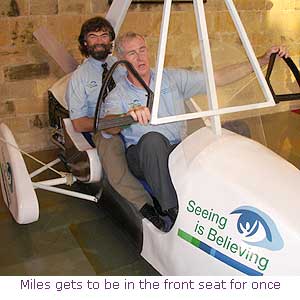 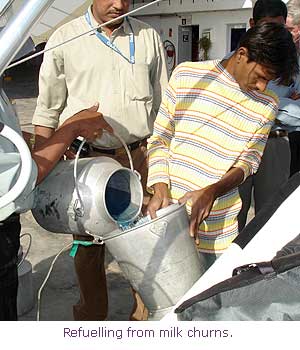 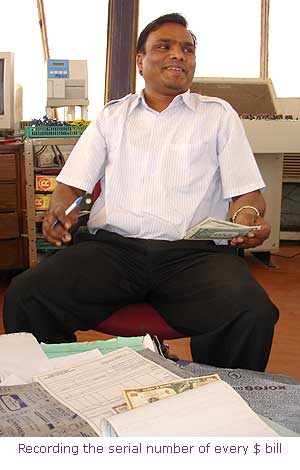 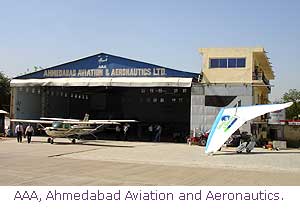 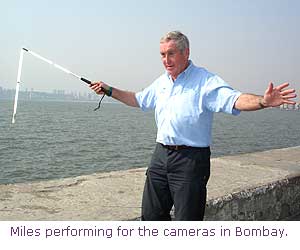 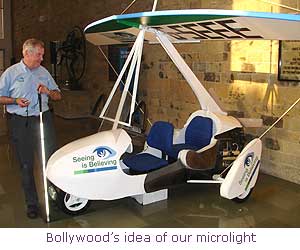 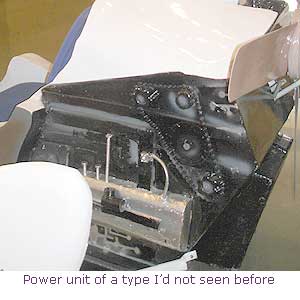 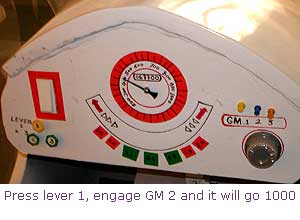 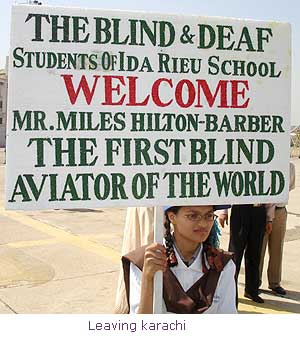 | Here we are on the executive floor of a smart hotel in Bombay, very flash it is too, and I daren't tell you how much it costs. Unbelievably though, there's no wireless internet in my room or even on my floor, they told me I have to go upstairs to the business centre to connect, and they wanted to charge me $14 an hour for the privilege. All hotels we've been to so far are charging extortionate rates to connect; when you're being charged the equivalent of a small country's GNP for the room I find this particular 'extra' completely outrageous given the essentially cheap nature of the service. On this occasion I threw my toys out of my pram and stamped on them but the poor bloke was another of those 'functionaries' and could do nothing. I'm beginning to understand where those Hilton girls get all their money from. Given that I shan't be sharing their fortune I hereby inaugurate the CFIEH - Campaign for Free Internet in Expensive Hotels. Officially we're in Mumbai, though nobody actually seems to call it that. We haven't actually come here in the microlight, that's in Bhopal at the moment. We're here to do a day of press and TV, we return tomorrow morning at some ungodly hour, I think we have to be at the airport at 3.30 AM or something to catch the flight back. Then I have the morning to perform an oil change on the machine, tweak the prop in an effort to reduce our profligate fuel consumption and try and get the paperwork machine going for a reasonably early departure the next morning. Tomorrow afternoon more press events are lined up and we're going to high tea with the state governor. We had the most marvellous time in Karachi. We were looked after royally by Dr Amer Azim Daudpota from the bank, and were introduced to his father who had been head of the Pakistan air force and the Zimbabwe airforce. A special departure ceremony was arranged at the VIP area of the airport which included a hundred or so blind or visually impaired children carrying banners saying things like "The blind and deaf students of Ida Rieu School Welcome Mr Miles Hilton-Barber, the first blind aviator of the World". For once they were allowed onto the apron and they all had a feel of the microlight, they got a smell too, as the machine had been plastered with bird shit in the hangar. The airport people had made a valiant effort to wash the wing but couldn't reach the middle. I leave putting my flying suit on until the very last minute otherwise you start to bake. We were in the machine, started up and ready to go, but ATC said there was some sort of problem. When we'd been negotiating for hangar space I'd got the impression that 'Executive air international services', our handling agents, weren't all that good. The bank people confirmed they seemed 'rather weak', so there we were ready to go but the paperwork wasn't ready. I shut down. At least the children who hadn't had a feel of the machine the first time round now got their chance. We were told everything was now done, Miles and I got suited up again and I was about to start up when someone came galloping over waving a bit of paper... The bill, and no ordinary one at that; Brian tells me they charged Vijay $9/litre when he went through Gwadar, so his fuel bill was $1,000; must have been something to do with him being an Indian. At least our fuel in Gwadar and Karachi were about the going price (ie expensive, but not that expensive) but landing & handling at Gwadar and Karachi $250 each? I suggested the bank people should argue about it and we shoved off before they could think of some other reason to turn us into baked potatoes. 330 Nm to Ahmadabad in India and it quickly became apparent our friendly tail wind had deserted us, the GPS was showing 55 Kts ground speed, things were going to be tight. Our long range tank pumps into the main tank, but originally there was no way of knowing either how much is in it or when it is pumped dry. In Oman I had fitted a clear transfer pipe so I can see the bubbles rather than leaving the pump running dry for ages but there's still no way of knowing how much is in the reserve tank as the sight gauge is deeply hidden underneath Miles' pannier and of course he can't see it even if he could get to it. The route took us out over the Great Rann of Kutch; the map suggests this is a vast (and I mean VAST) area of dry lakes, but for us it was flooded. Years ago when I was driving trucks around Africa we stopped at a vast French led construction project to build a canal which would divert millions of tons of water from the Sudd, a huge swamp in the upper reaches of the White Nile in Sudan, into the lower reaches of the Nile for irrigation. Most of the work was being done by a gigantic bucket-wheel machine weighing thousands of tons they told me had originally built a canal in Pakistan. They'd had terrible trouble with it because Sudanese mud is much more sticky than Pakistani mud and wouldn't come out of the buckets. In the first two or three years they only managed a few Km though when we met it, it was doing around 100 Km a year. I flew over the same machine on my way to Capetown in 1984. By that time rebel activity had forced the entire project to be abandoned and the machine was slowly sinking into Sudan's black cotton soil; I expect it's still there now. We flew over a very wide canal draining the Great Rann of Kutch, I wondered if this is where the machine had originally come from. The fact that we should have been wearing life jackets over this water was secondary to the fuel problem though. I decided that if we had a completely full main tank at about the half way mark then we would probably be OK as it is a bit bigger than the reserve. Also at the half-way mark just across the Rann of Kutch there seemed to be a small airstrip on my map called Khavada, though not in my book. We could stop there, but being an international flight I expected it would create all sorts of havoc with our permissions. Just before Khavada I watched for bubbles while Miles had his fingers in the fuel filler to see if it was full. I got bubbles just as Miles touched fuel... We decided to press on out over the Little Rann of Kutch which was dry. At this stage we also started to pick up a slight tail wind which was a help but as we neared Ahmadabad I wasn't too confident we'd get there. The land had changed into millions of tiny fields not really great for landing in. At least they knew we were coming as I'd managed to relay a message via Speedbird 514, a BA flight way overhead. "Brave people", he commented. I was beginning to agree, off the Ranns it got pretty turbulent in the mid-afternoon heat. The last 10 miles was the worst, gauge was on empty and I asked to stay at 7500 ft until the last moment which the controller thought a bit strange. In fact we had a bit left. Difficult to say how much because we were refuelled out of milk churns. They claimed it was (and I paid for) 90 litres which is perhaps 5 litres -more- than full capacity. If their 90 was really our 80 then for a 5 hour flight that still makes 16 litres an hour... We really are golloping up fuel. One thing is for certain, something has got to be done about it. At least there was no problem with hangarage at Ahmadabad, there's a nice little aero club called ANA, Ahmadabad Aviation and Aeronautics run by Lt. Col V. K. Nagar and they were delighted to host the machine for the night. On the other hand, Ahmadabad (you try saying it fast, or even slowly) was a fairly rude introduction to the mysteries of Indian bureaucracy. At least they had carbon paper, but you must fill 14 forms just for the customs. I was kept busy doing all that for several hours whilst Miles was kept busy explaining why we were here. Miles is really very good at this stuff, he could charm the leg off a donkey given the chance; once people realize we're trying to raise funds for Seeing is Believing they are invariably as helpful as they can be; charitable causes seem to be a popular thing in India. Seeing is Believing restored the sight of 78,000 children in India just last year; sometimes it only costs $20 for one child and for every dollar, pound or rouble you contribute Standard Chartered Bank doubles it, so why not pop over to their website now and help out? Eventually we managed to escape from the airport into the hands of the local bank people. They told us they had laid on a press conference with no less than 60 journalists present, but they'd pretty much all disappeared whilst I was busy filling out forms. We spent the rest of the evening trying to defend the Indian way of doing things to the remaining journalists as the last thing we wanted was to have a load of coverage the next morning suggesting the service we'd got was bad... We'd never get out of the airport. It took long enough anyway. The last interview was at 10.30, we were back at the airport at 8. We actually left at 13.00. The catch is the almost standard looking flight plan form, for internal flights there's an extra section at the bottom which must be signed and stamped by every official in the airport; ATC, met, security and so on. Of course landing and airport fees were charged in US dollars. You can be sure they'll never have any US $ change but as a penalty for my having the exact money they had to record the serial number of every $ bill I handed over; in triplicate. They finally played the same trick as Karachi - everything done? "yes"; paid all we need to pay? "yes, you can go". So there we were in the machine engine running all set to go when someone came running over demanding some piece of paper. I just shoved the fist full of papers I'd been given at the bloke, but the vital one was missing, so we sat and baked for another 40 minutes before we finally got the go ahead. ATC nearly caught me out as we taxied for the runway by double checking I had all the correct frequencies I might need en-route and they have the rather annoying habit of saying "that is correct" when you read the QNH back to them. Nevertheless, we were off. Met had suggested we might get a bit of a tailwind higher than we went yesterday so I'd filed the flight plan at 9,500 ft which I also hoped might keep us above most of the sub-continent's afternoon turbulence which we'd got a taster of once we'd got off the Ranns. It was 39 degrees on the ground when we took off, I had to be very careful not to cook the engine on the long climb to more sensible temperatures at 5 or 6,000 ft. Flying over India is a bit like flying through a big soup. From now on they tell me it will get hotter and hotter until the monsoon in June, at lower levels there was very little wind and the air is just full of dust and smoke. You can see there is a top to it but I've no idea how high it is. About 10 miles out ATC told me my transponder wasn't working - the little orange light was flashing happily whenever it was doing it's thing and seemed to be OK to me, but a bit worrying, I've no idea where we could get a replacement in a hurry, I hoped it was really some sort of problem with their radar. Miles' compass seems to have given up too. All anyone's ever heard about Bhopal is that terrible chemical accident they had in 1984. I was expecting a big smoky industrial town but in fact it's quite the opposite; it's really rather a pleasant place with big lakes and fountains right in the middle of town. After the mistakes of Ahmadabad, coordination with the bank people was much better and we were parked in an enormous hangar as soon as we arrived. The paperwork didn't take that long either. We were flown to Bombay that evening on Jet Airways, one of India's new breed of independent airlines for a day of press stuff and a 'Town hall' in the commercial capital of India. Quite why the plan didn't allow for us to go to Bombay under our own steam I never really discovered but in any case they knew the machine wouldn't be coming and had got a Bollywood props house to build a replica for Miles and I to sit in for the cameras. At least this avoided the incredible hassle of getting journalists airside at airports though its design and construction did leave a quite bit to the imagination. I suppose it could have been described as a 'Super Quik' as the wing was tiny and the air speed indicator was calibrated up to 1000. The Odometer was showing 67,700 which was a bit of an exaggeration on the 4700 Nm we've done since London. A 'Town hall' is where all the staff are assembled in a big hall or theatre somewhere and the boss briefs them on how the bank is doing. India's economy is booming and the bank has been doing very well as a consequence so the attitude was very positive. The announcement that as from the end of the month (a few days time) all employees would be working a 5 day week attracted extended applause. Miles did a brilliant presentation on behalf of Seeing is Believing. In his normal trade as a corporate speaker he gets to meet a lot of leaders of commerce and industry but says even he's impressed by how dedicated the Bank is to its charity. Every employee is given a few days paid leave each year to work for it and my impression is that they really do care about it, in other words it's more, much more, than just some sort of corporate publicity vehicle. What's more, the bank covers all administrative costs and will match one for one every dollar raised, so the dollar you donate is converted to two, and every cent is used to restore people's sight. Rather extraordinarily, one of the management committee in Bombay said he'd met me before, at my Brother John's wedding in France ten years ago. |


